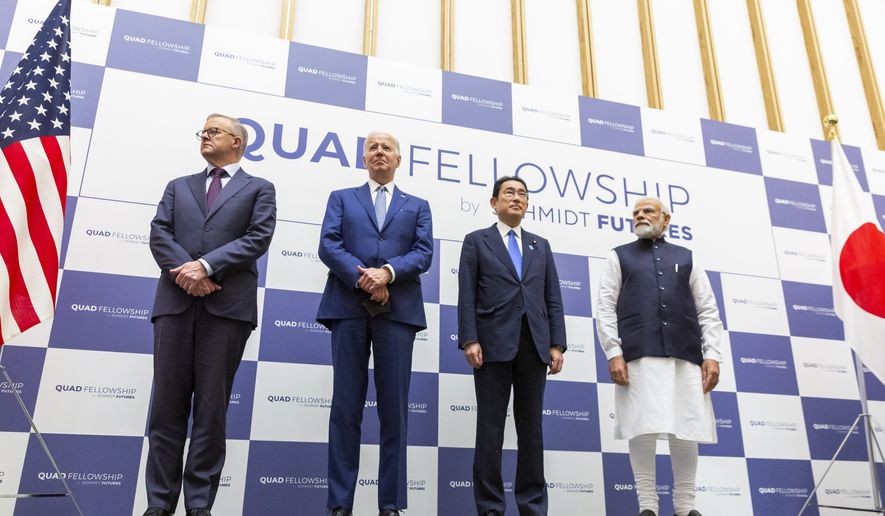U.S. President Biden and other leaders of the “Quad” strategic group with India, Australia and Japan issued a carefully worded warning Tuesday to China, which has triggered unease in recent years by building military bases on disputed islands in the South China Sea.
The leaders expressed collective opposition to “coercive, provocative or unilateral actions” that would change the status quo in the Indo-Pacific.
The Quad showed unity one day after Mr. Biden made global headlines by saying bluntly that the U.S. will intervene militarily if China attempts to invade Taiwan. The White House has since walked back the statement.
The summit in Tokyo represents the diplomatic centerpiece of Mr. Biden’s weeklong visit to Asia.
China’s military muscle-flexing, North Korea’s increasingly provocative missile tests and Russia’s brutal invasion of Ukraine have loomed over the gathering of the region’s four most powerful democracies. Successive U.S. administrations have sought to rally the Quad against the authoritarianism and aggression emanating from Beijing, Moscow and Pyongyang.
Mr. Biden, who ended his Asia trip after the summit, attempted to seize on the gathering as a chance to show solidarity.
The U.S., India, Australia and Japan are navigating “a dark hour in our shared history” stemming from the Russian invasion of Ukraine, Mr. Biden said at the opening of the summit. He called on other Quad leaders to work more cohesively to stop Russian President Vladimir Putin’s aggression.
“This is more than just a European issue,” Mr. Biden said. “It’s a global issue.”
A joint statement at the close of the summit was notably less explicit. Although the Quad openly condemned “North Korea’s destabilizing ballistic missile development and launches,” it did not specifically mention Russia’s invasion of Ukraine.
The leaders said only that they had “discussed our respective responses to the conflict in Ukraine and the ongoing tragic humanitarian crisis, and assessed its implications for the Indo-Pacific.”
To avoid an economic backlash, the Quad stopped short of directly naming China as a perpetrator of regional tensions. All of the member countries rely heavily on Chinese trade.
The joint statement did warn against specific moves in the East and South China seas, such as “the militarization of disputed features, the dangerous use of coast guard vessels and maritime militia, and efforts to disrupt other countries’ offshore resource exploitation activities.” Chinese forces have been widely accused of engaging in such moves.
Beijing sharply criticized Japan for hosting the Quad meeting. Foreign Minister Wang Yi warned Tokyo ahead of the meeting about China’s distaste for “joint Japan-U.S. anti-China rhetoric.”
The “Editor’s Pick” article Tuesday on the opinion page of the Global Times, a newspaper tied to China’s ruling Communist Party, carried the headline: “Japan’s subservience to US will strain China ties, threaten regional security.”
Chinese leaders appear to be particularly concerned about the Quad’s posture on the issue of Taiwan, especially after Mr. Biden’s comment Monday that the burden to protect Taiwan is “even stronger” after Russia’s invasion of Ukraine.
Mr. Biden promised that the U.S. would intervene militarily if Chinese forces invade the island democracy, which China claims as part of its sovereign territory.
The White House has since insisted that Mr. Biden’s unusually forceful comments did not amount to a shift in U.S. policy toward Taiwan.
Asked by reporters at the Quad summit whether his comments on Taiwan were meant to mark a policy change, Biden replied, “No.”
With regard to Russia’s war in Ukraine, Mr. Biden appeared to be pressuring India to stand more cohesively with Europe and the other major democracies of the Indo-Pacific. India is the one Quad country that has not publicly condemned the invasion.
Russia is India’s biggest supplier of military hardware. Unlike the other Quad countries and nearly every other U.S. ally, India has resisted imposing any sanctions on Moscow.
With Indian Prime Minister Narendra Modi sitting nearby at the start of the Quad summit in Tokyo, Mr. Biden made the case that the world has a shared responsibility to assist Ukraine’s resistance to Russia’s aggression.
“We’re navigating a dark hour in our shared history,” the president said. “The Russian brutal and unprovoked war against Ukraine has triggered a humanitarian catastrophe, and innocent civilians have been killed in the streets and millions of refugees are internally displaced as well as in exile.
“The world has to deal with it, and we are,” Mr. Biden said.
In comments to reporters after a one-on-one meeting, Mr. Biden said he and Mr. Modi discussed Russia’s invasion of Ukraine “and the effect it has on the entire global world order.”
Mr. Biden said the U.S. and India will continue to consult “on how to mitigate these negative effects.” In a reflection of India’s relationship with Moscow, the Quad leaders’ post-summit joint statement did not mention Russia by name.
Mr. Modi also made no mention of the war in Ukraine. Instead, he ticked off several trade and investment programs that he said he had discussed with Mr. Biden.
With the tense geopolitical issues as a backdrop, the Quad announced some modest initiatives, including an effort to provide pediatric COVID-19 vaccines to countries most in need and a program to help nations improve security and environmental awareness of their territorial waters.
The Quad last year pledged to donate 1.2 billion vaccine doses globally. So far, the group has provided about 257 million doses, according to the Biden administration.
• This article is based in part on wire service reports.
• Guy Taylor can be reached at gtaylor@washingtontimes.com.




Please read our comment policy before commenting.